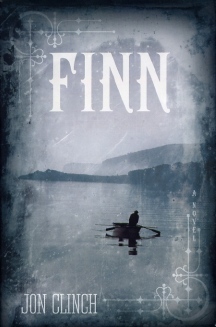 |
 Jon Clinch
Jon Clinch
Finn
Reviewed by: Rick Kleffel © 2007
Random House
US First Edition Hardcover
ISBN 978-1-4000-6591-2
296 Pages; $23.95
Publication Date: 02-20-2007
Date Reviewed: 03-20-2007
Index:
General Fiction Horror
We may live our lives in the light, but experience them only in the shadows. We may stride through the years, day following day, but our memories will be anything but sequential. Anything we experience is edited and recast in our own imagery. Even literature, a bedrock which does not demonstrably change, may be re-interpreted by subsequent generations. The text for 'The Adventures of Huckleberry Finn' has been here for us to enjoy for well over a hundred years. But our experience of that text can change with each passing day. There are mysteries there left unsolved, and most tantalizingly, the death of the elder Finn, Huck's father. Jon Clinch's 'Finn' offers a dark, mesmerizing vision of Huck's father. It's a gorgeously crafted, beautifully written tale of murder and self-loathing, an achronological journey up a filthy river of blood. Clinch quickly establishes that 'Finn' is no 'Huck Finn', and his Biblical prose proves to be up to the task of establishing an identity that acknowledges Twain without using it as a crutch. The two works complement one another in an unusual manner. If 'The Adventures of Huckleberry Finn' is the New Testament, full of hope and understanding, sunlight, irony and grace, then 'Finn' is the Old Testament, replete with vengeance sworn against enemies that deserve smiting.
In the beginning of the novel, a body floats downstream. It is rotting and the stream is shallow and murky. It is not Finn's body; not yet. That is to come later, but not in chronological order. Clinch tells his story in the manner of a river flowing through a thickly polluted flat, with stinking bubbles of malodorous memory rising to the surface of the story when they are called for. Finn is a willfully ignorant man, who captures a slave girl and takes her as his bride, shaming himself and his family. Holed up in a shack on the side of the river, he begets a child. Huck Finn, a mulatto boy who can pass for white. It's a daring re-invention of Twain's world, and the plot that unfolds is literally stomach wrenching. Readers will have to pay close attention, because Finn's not an orderly man with an orderly mind. He's a murderous, scavenging thief, and the plot veers between the past and the present based on the level of self-hatred that Finn himself experiences.
Clinch's prose is darkly beautiful, filled with music and an unflinching ability to gaze at the abyss and become the monster. Told in an omniscient third-person perspective, it is infected by the supernatural, surreal view of those who cling to life at the edge of civilization. Little in the book seems real, but it all seems authentic, as if Clinch plucked his words from minds that could barely comprehend what they were experiencing. Though 'Finn' is a literary novel through and through, it often reads like a literary horror novel, and may appeal to readers of genre fiction. Few writers have so effortlessly conveyed a pre-scientific view of the world around us. 'Finn' is steeped in superstition and suspicion, and reminiscent of the work of Flannery O'Conner. While Clinch does replay some events from Twain, he provides a perspective that is unique to this work. The writing here very effectively lets Clinch assert his own identity as writer.
When you create a character as detestable as Finn, you play a dangerous game. Readers generally like their horrors to have some sympathetic aspect, and Clinch cleaves quite close to an unpleasant truth about our nation as well as his main character. That said, there are flashes of something in Finn that keep us glued to the pages here. After all, a character as filled with self-hatred as is Finn must have some doubts about his actions, even if he fearlessly pursues them. And there are flashes of something in Finn that keep him on the edge of the abyss. We may know there is no hope for this character, and Finn himself may think this is true, but he doubts it just enough to offer a glimpse of the potential for love if not the actuality. Mary, the captured slave girl, offers readers the actuality of love, though Huck himself is relegated to the background in a manner that helps to character the father more than the son.
Fathers and sons, slaves and masters, memory and reality; 'Finn' is a novel filled with duality that spends most of its time in the murky darkness. Clinch echoes Twain and himself, creating a novel that is a shadow of the shadows, the sediment beneath the murk, the filth beneath the fury. There is light here as well; in the gorgeous prose, in the evocative re-ordering of story and chronology. "'Vengeance is mine, I will repay,' saith the Lord." And it shall be served cold. Very cold.
|
 |
